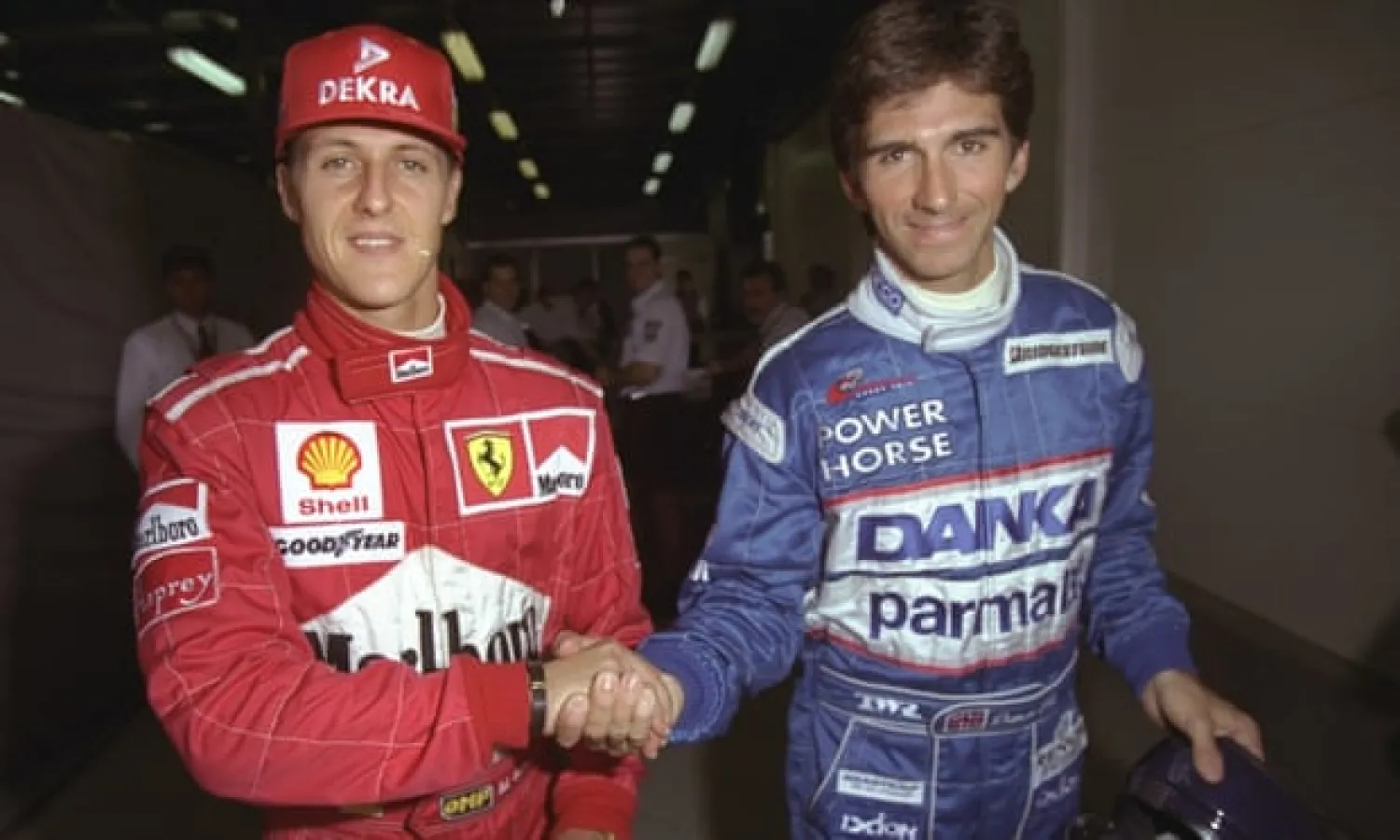A few months ago Damon Hill was waiting in a lounge at Heathrow airport, watching the departure board for news of his scheduled flight to Cologne. He had been invited to the opening of a museum dedicated to the career of Michael Schumacher, his old rival. The flight was delayed. And then delayed some more.
He was sitting with another invited guest. This was Ross Brawn, the engineer who masterminded all of Schumacher’s seven world titles: two with Benetton, five with Ferrari, hardly one of them without controversy. “We’ve never really brought up some of the things that went on and that might be interesting to know,” Hill said on the phone this week. “But as you get older, you look back and it all seems mad. It’s so intense, everyone wants to win, and some people cross the boundary. It’s a choice people make.”
Schumacher, the winner of 91 Formula One grands prix and seven world championships, will be 50 years old on Thursday. Last week was the fifth anniversary of his disappearance from public view as a result of a brain injury suffered in a low-speed fall while skiing with his son in France. The poignancy of a life risked at 200mph for so long being seemingly destroyed by so banal an accident was missed by no one, particularly his erstwhile rivals.
Tribal loyalties usually lay behind the conflicting opinions on the way Schumacher conducted his career. In Germany and to the worldwide legion of Ferrari fans he was close to being a deity. Those supporting his fiercest rivals, who included not just Hill but Ayrton Senna, Jacques Villeneuve and Fernando Alonso, were not so fond of the tactics he and his team occasionally employed. But they will have found their feelings inevitably modified in the light of the tragedy that befell Schumacher and his family on the Combe de Saulire above Méribel on 29 December 2013.
Hill’s initial sadness on hearing of the accident was complicated by an additional factor. He, too, has come to love skiing. When he heard that the accident had happened while Michael was on the slopes with his son, Mick, then aged 13, he felt a special sense of regret. “I would have loved to have gone skiing with my dad, you know?” he said on Monday. But his father, the double world champion Graham Hill, died in a plane crash in 1975, when his only son was 15.
Now, like Damon, young Mick Schumacher is following in his father’s wheeltracks. At 19 years old, after winning this year’s European Formula Three championship with eight victories from 30 starts, he is moving up in 2019 to Formula Two, just one rung away from the top level, in which his father made his debut at 22. That last leap, of course, usually turns out to be harder than all the earlier ones put together. And as yet no one knows whether Mick Schumacher has inherited the combination of qualities – great skill, endless appetite for hard work, ruthlessness – that drove his father to unprecedented success.
To begin with, the son of Schumacher chose to disguise his identity. His name appeared on the entry lists as Mick Betsch – his mother’s maiden name – or Mick Junior, which probably didn’t fool many people. But his career has been handled with discretion, particularly given the unusual degree of interest in his progress.
Discretion also characterises the way Corinna Schumacher and her husband’s manager, Sabine Kehm, have succeeded in drawing a veil of privacy around the family’s home in Switzerland, where special facilities were installed for Michael’s treatment and care. Kehm, a former newspaper journalist who became Michael’s personal press officer during his Ferrari years and took over as his manager in 2010, deserves some kind of award for the dignified way she has held the more intrusive elements of the media at bay. Now she manages Mick, too.
Today, everyone with any direct relationship to Michael Schumacher, past or present, chooses their words with extreme care when discussing his life since the accident. “To even contemplate it is frightening,” Hill says. “Whatever my feeling was about Michael and the way he went about his career became irrelevant. From a human point of view, it was so upsetting.”
In their racing days, particularly between 1994, when Schumacher won his first title by crashing into Hill in Adelaide, and 1996, when the Englishman finally triumphed at Suzuka, their duel seemed to be a double caricature of German arrogance and cunning on the one side and British diffidence and pluck on the other. Yet although Schumacher’s self-confidence made him seem invulnerable, occasionally Hill saw something else. “There was a different Michael,” he says, “but I didn’t know him. I got glimpses of a softer and more generous, likeable guy. But as a racer he was always hard.”
The flight to Cologne was finally cancelled altogether, and Hill missed the opening of the museum. “It was nice of them to invite me,” he said. “I was a bit surprised.” Some time later he made a private visit, during which he went to have a look at the nearby town of Kerpen, Michael’s birthplace, where his father ran a kart track.
“His legacy is huge,” Hill said. “He’s such a massive star in Germany, where everybody believed he could walk on water. Although I didn’t agree with his approach to sport, I know the pressure he was under. I was in the eye of the storm myself a little bit, when everybody wants to know about everything that happens in your life. Now his family have a lot to deal with. But we’re watching Mick getting on with it. So the story continues.”
The Guardian Sport









